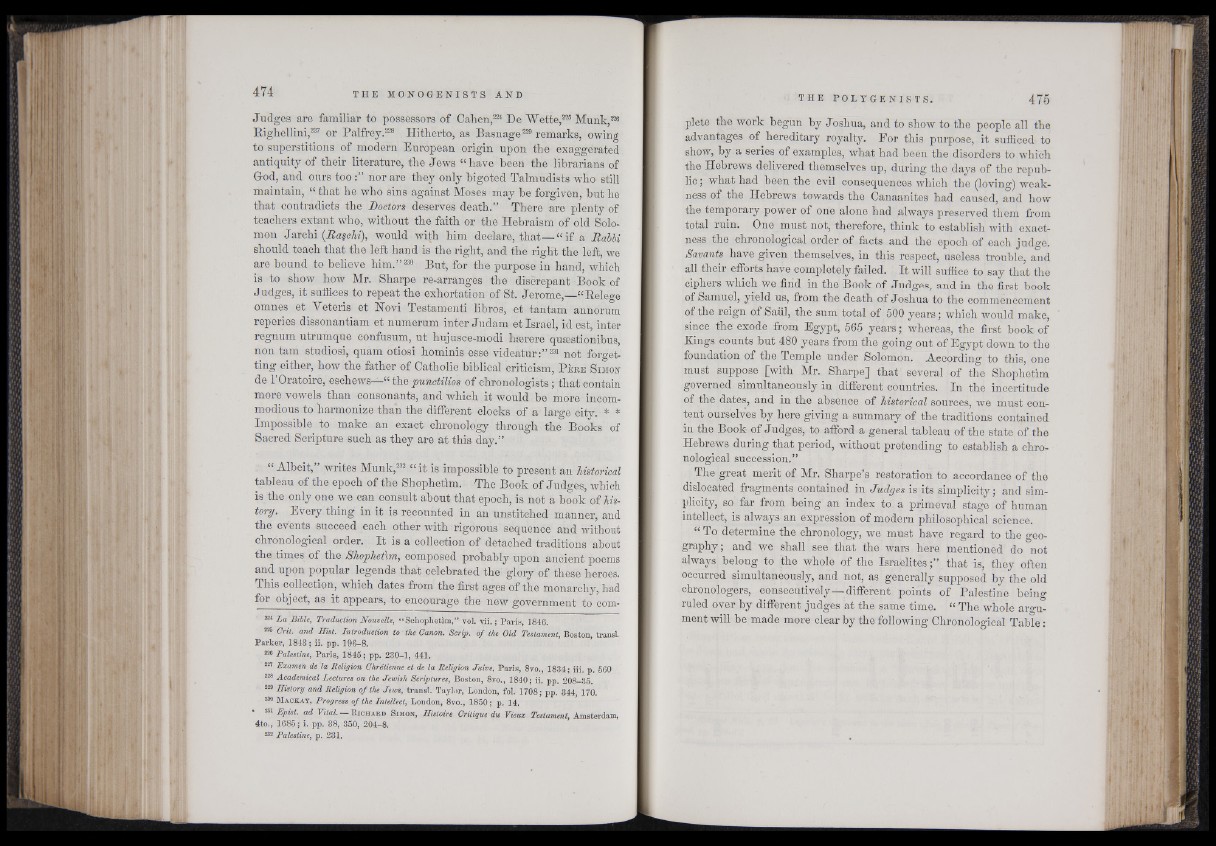
Judges are familiar to possessors of Cahen,224 De Wette,225 Munk,228
Righellini,227 or Palfrey.228 Hitherto, as Basnage229 remarks, owing
to superstitions of modern European origin upon the exaggerated
antiquity of their literature, the Jews “ have been the librarians of
God, and ours too nor are they only bigoted Talmudists who still
maintain, “ that he who sins against Moses may he forgiven, hut he
that contradicts the Doctors deserves death.” There are plenty of
teachers extant who, without the faith or the Hebraism of old Solomon
Jar chi (Ranchi), would wi^h him declare, that—“ if a Rabbi
should teach that the left hand is the right, and the right the left, we
are bound to believe him.” 230 But, for the purpose in hand, which
is to show how Mr. Sharpe re-arranges the discrepant Book of
Judges, it suffices to repeat the exhortation of St. Jerome,—“Relege
omnes et Yeteris et Rovi Testamenti libros, et tantam annorum
reperies dissonantiam et numerum inter Judam et Israel, id est, inter
regnum utrumque confusum, ut hujusee-modi hærere quæstionibus,
non tarn studiosi, quam otiosi hominis esse videatur:”231 not forgetting
either, how the father of Catholic biblical criticism, P è r e S i m o n
de l’Oratoire, eschews—“ thè punctilios of chronologists ; that contain
more vowels than consonants, and which it would he more incommodious
to harmonize than the different clocks of a large city. * *
Impossible to make an exact chronology through the Books of
Sacred Scripture such as they are at this day.” ■
“ Albeit,” writes Munk,232 “ it is impossible to present an historical
tableau of the epoch of the Shophetim. The Book of Judges, which
is the only one we can consult about that epoch, is not a book of history.
Every thing in it is recounted in an unstitched manner, and
the events succeed each other with rigorous sequence and without
chronological order. It is a collection of detached traditions about
the times of the Shophetim, composed probably upon ancient poems
and upon popular legends that celebrated the glory of these heroes.
This collection, which dates from the first ages 5f the monarchy, had
for object, as it appears, to encourage the new government to com224
La Bible, Traduction Nouvelle, “ Schophetim,” vol. vii.; Paris, 1846.
225 Crit. and Hist. Introduction to the Canon. Scrip, of the Old Testament, Boston, transL
Parker, 1843 ; ii. pp. 196-8.
226 Palestine, Paris, 1846 ; pp. 230-1, 441.
227 Examen de la Religion Chrétienne et de la Religion Juive, Paris, 8vo., 1834; iii. p. 560
228 Academical Lectures on the Jewish Scriptures, Boston, 8vo., 1840; ii. pp. 208-35.
229 History and Religion of the Jews, transi. Taylor, London, fol. 1708; pp. 344, 170.
230 M a c k a y , Progress of the Intellect, London, 8vo., 1850 ; p . 14.
231 Æpist. ad Vital. — R i c h a r d S im o n , Histoire Critique du Vieux Testament, Amsterdam,
4to., 1685; i. pp. 38, 350, 204-8.
232 Palestine, p. 231.
plete the work begun by Joshua, and to show to the people all the
advantages of hereditary royalty. For this purpose, it sufficed to
show, by a series of examples, what had been the disorders to which
the Hebrews delivered themselves up, during the days of the republic;
what had been the evil consequences which the (loving) weakness
of the Hebrews towards the Canaanites had caused, and how
the temporary power of one alone had always preserved them from
total ruin. One must not, therefore, think to establish with exactness
the chronological order of facts and the epoch of each judge.
Savants have given themselves, in this respect, useless trouble, and
all their efforts have completely failed. It will suffice to say that the
ciphers which we find in the Book of Judges, and in the first book
of Samuel, yield us, from the death of J oshua to the commencement
of the reign of .Saul, the sum total of 500 years; which would make,
since the exode from Egypt, 565 years; whereas, the first book of
Kings counts hut 480 years from the going out of Egypt down to the
foundation of the Temple under Solomon. According to this, one
must suppose [with Mr. Sharpe] that several of the Shophetim
governed simultaneously in different countries. In the incertitude
of the dates, and in the absence of historical sources, we must content
ourselves by here giving a summary of the traditions contained
in the Book of Judges, to afford a general tableau of the state of the
Hebrews during that period, without pretending to establish a chronological
succession.”
The great merit of Mr. Sharpe’s restoration to accordance of the
dislocated fragments contained in Judges is its simplicity; and simplicity,
so far from being an index to a primeval stage of human
intellect, is always an expression of modern philosophical science.
“ To determine the chronology, we must have regard to the geography
; and we shall see that the wars here mentioned do not
always belong to the whole of the Israelites;” that is, they often
occurred simultaneously, and not, as generally supposed by the old
chronologers, consecutively—different points of Palestine being
ruled over by different judges at the same time. “ The whole argument
will be made more clear by the following Chronological Table: